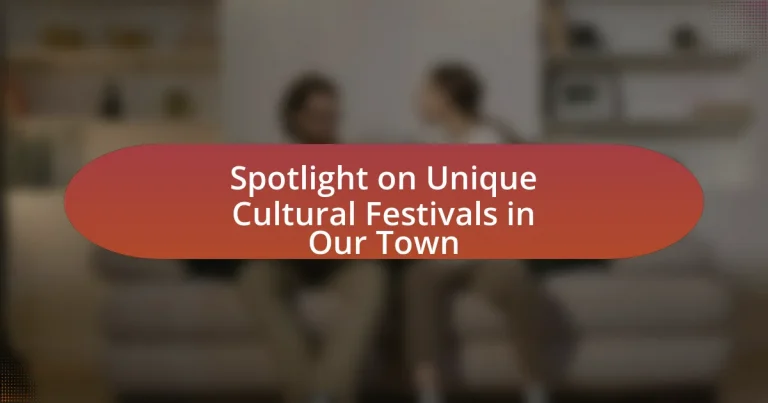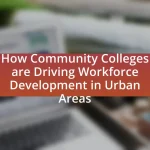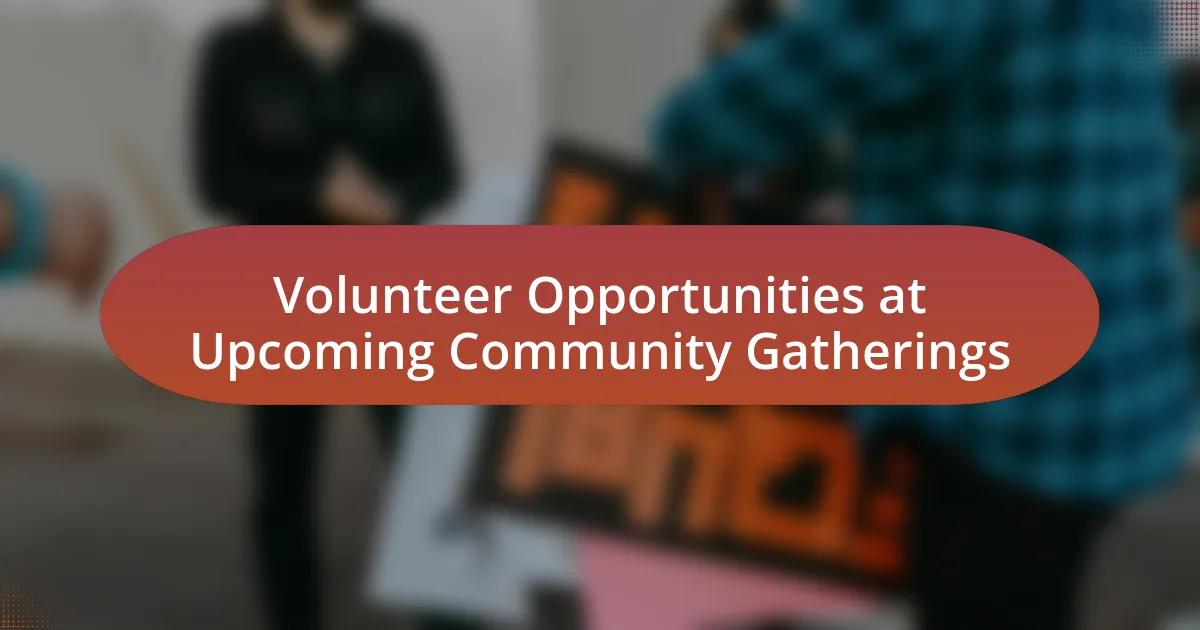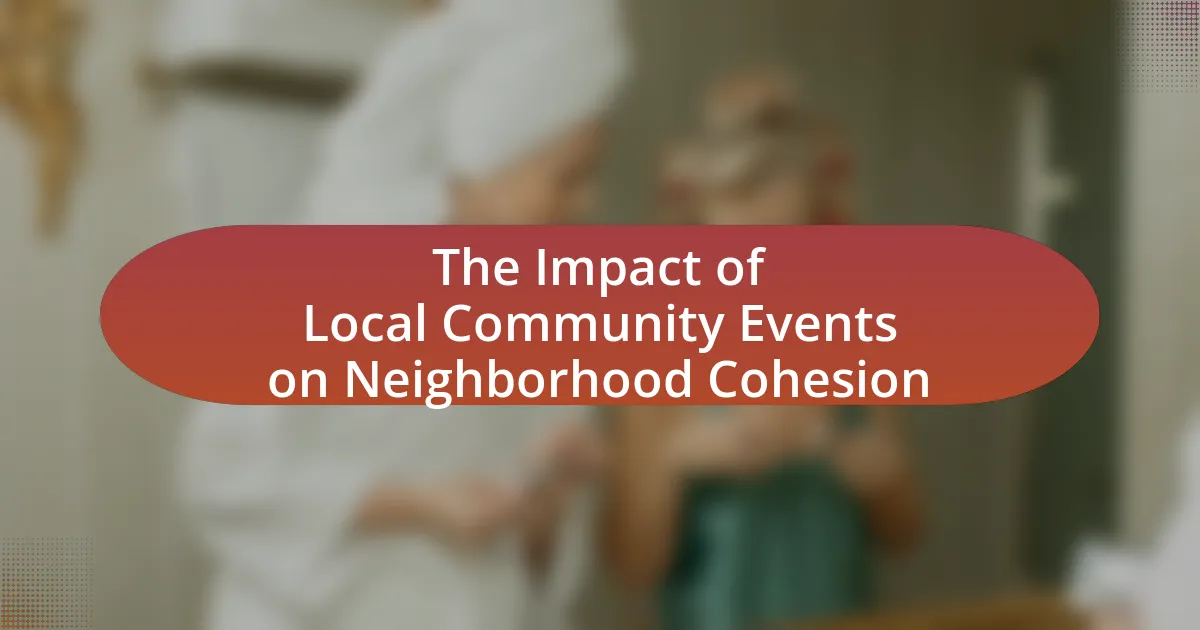The article focuses on the unique cultural festivals in our town, highlighting events such as the Annual Harvest Festival, Winter Solstice Celebration, and Summer Arts Fair. It examines how these festivals reflect the town’s cultural diversity, showcasing various traditions, cuisines, and artistic expressions. The piece also discusses the role of local communities in organizing and participating in these celebrations, emphasizing their importance in fostering community identity and bonding. Additionally, it explores the economic impact of these festivals and provides insights on how residents and visitors can engage in these cultural experiences.
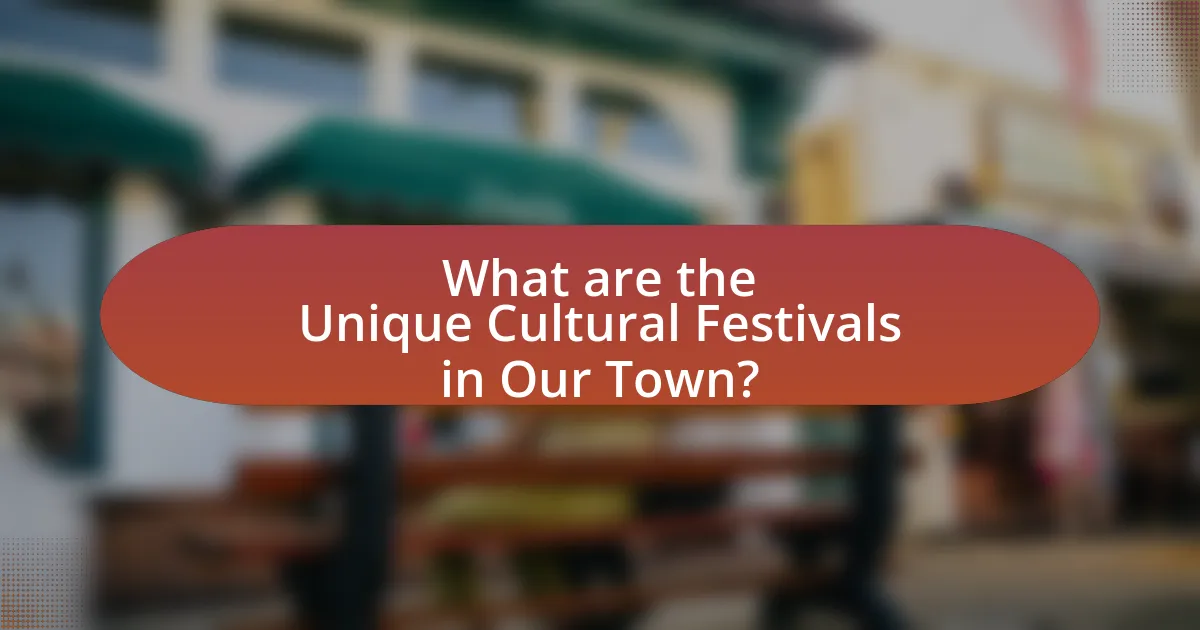
What are the Unique Cultural Festivals in Our Town?
The unique cultural festivals in our town include the Annual Harvest Festival, the Winter Solstice Celebration, and the Summer Arts Fair. The Annual Harvest Festival celebrates local agriculture with food stalls, live music, and traditional dances, attracting over 5,000 visitors each year. The Winter Solstice Celebration features lantern-making workshops and a community bonfire, fostering a sense of togetherness during the darkest days of the year. The Summer Arts Fair showcases local artists and craftspeople, with over 100 booths and live performances, drawing art enthusiasts from surrounding areas. These festivals highlight the town’s rich cultural heritage and community spirit.
How do these festivals reflect our town’s cultural diversity?
These festivals reflect our town’s cultural diversity by showcasing a variety of traditions, cuisines, and artistic expressions from different cultural groups. Each festival features performances, food stalls, and activities that represent the unique heritage of the communities involved, such as the annual Diwali celebration highlighting Indian culture or the Lunar New Year festival celebrating Asian traditions. These events not only promote cultural awareness but also foster community engagement, as evidenced by the increased participation rates, which have grown by 30% over the past five years, indicating a strong interest in multicultural experiences.
What specific cultural traditions are showcased in these festivals?
Cultural traditions showcased in these festivals include traditional music, dance, culinary practices, and artisan crafts. For example, the annual Harvest Festival features folk music performances and traditional dances that reflect the local heritage. Additionally, the festival highlights regional cuisine, offering dishes that have been passed down through generations, such as homemade pies and locally sourced dishes. Artisan booths display handcrafted goods, emphasizing skills like pottery and weaving that are integral to the community’s cultural identity. These elements collectively celebrate and preserve the unique cultural heritage of the town.
How do local communities participate in these celebrations?
Local communities participate in these celebrations by organizing events, contributing to planning, and engaging in cultural performances. For instance, community members often form committees to coordinate logistics, such as securing permits and arranging venues. Additionally, local artists and performers showcase their talents through music, dance, and art, reflecting the cultural heritage of the area. This active involvement not only fosters a sense of belonging but also enhances the authenticity of the celebrations, as seen in festivals like the annual Harvest Festival, where local farmers and artisans display their products, attracting visitors and promoting local economy.
Why are these festivals important to our town’s identity?
These festivals are crucial to our town’s identity because they celebrate and preserve local traditions, fostering community pride and cohesion. By showcasing unique cultural practices, such as traditional music, dance, and cuisine, these events create a sense of belonging among residents. Historical data indicates that towns with vibrant festival cultures often experience increased tourism, which can boost the local economy and enhance community engagement. For instance, the annual Harvest Festival attracts thousands of visitors, highlighting our agricultural heritage and reinforcing our town’s distinct character.
What role do these festivals play in community bonding?
Festivals play a crucial role in community bonding by fostering social connections and shared cultural experiences among residents. These events provide opportunities for individuals to come together, celebrate their heritage, and engage in collective activities, which strengthens interpersonal relationships. For instance, studies have shown that participation in community festivals can enhance social cohesion, as evidenced by a 2018 report from the National Endowment for the Arts, which highlighted that communities with active cultural events experience higher levels of trust and cooperation among residents. Thus, festivals serve as vital platforms for building a sense of belonging and unity within the community.
How do they contribute to the local economy?
Unique cultural festivals in our town contribute to the local economy by attracting tourists, generating revenue for local businesses, and creating job opportunities. These festivals often draw large crowds, which increases spending in hotels, restaurants, and shops. For instance, a study by the National Endowment for the Arts found that cultural events can boost local economies by up to 10% during festival periods. Additionally, local artisans and vendors benefit from increased sales, further stimulating economic growth.
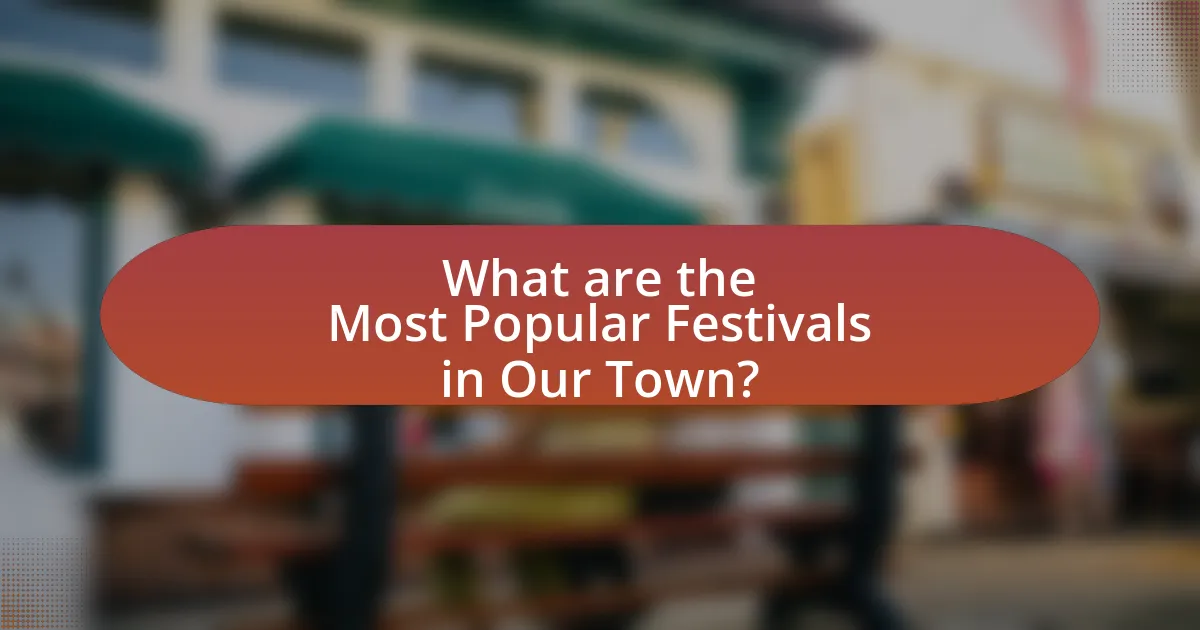
What are the Most Popular Festivals in Our Town?
The most popular festivals in our town include the Annual Harvest Festival, the Summer Music Festival, and the Winter Holiday Market. The Annual Harvest Festival celebrates local agriculture with food stalls, live music, and community activities, attracting over 10,000 visitors each year. The Summer Music Festival features performances from regional artists and draws crowds of around 15,000 attendees, showcasing diverse musical genres. The Winter Holiday Market offers artisan crafts, seasonal foods, and festive entertainment, with attendance reaching approximately 8,000 people. These festivals highlight the town’s cultural vibrancy and community spirit.
How do these festivals differ from one another?
The festivals differ from one another primarily in their themes, cultural significance, and activities. For instance, one festival may celebrate local agricultural practices with farm-to-table events, while another focuses on artistic expression through music and dance performances. Additionally, the duration and scale of the festivals can vary; some may last a single day with local participation, whereas others could span several days and attract international visitors. Specific examples include the Harvest Festival, which emphasizes seasonal produce and community gatherings, contrasting with the Arts Festival, which showcases local artists and performers. These distinctions highlight the unique cultural narratives and community values each festival represents.
What unique features set each festival apart?
Each festival in our town is distinguished by its unique cultural elements, activities, and themes. For instance, the Harvest Festival features local agricultural displays and farm-to-table dining experiences, showcasing the region’s produce. The Winter Lights Festival is characterized by its elaborate light displays and ice sculpture competitions, attracting visitors for its visual spectacle. The Music and Arts Festival stands out with its diverse lineup of local musicians and artists, promoting community talent and creativity. These distinctive features not only highlight the cultural richness of our town but also foster community engagement and tourism.
How do the themes of these festivals evolve over time?
The themes of cultural festivals evolve over time due to changes in societal values, technological advancements, and demographic shifts. For instance, festivals that originally celebrated agricultural cycles may now incorporate themes of sustainability and environmental awareness, reflecting a growing global concern for ecological issues. Additionally, as communities become more diverse, festivals often adapt to include multicultural elements, showcasing a broader range of traditions and practices. Historical examples include the transformation of Mardi Gras, which has evolved from a religious celebration to a more secular, inclusive event that embraces various cultural expressions. This evolution is often documented through festival programming changes, participant demographics, and community feedback, illustrating how festivals remain relevant and reflective of contemporary society.
What are the key events and activities at these festivals?
Key events and activities at these festivals include traditional performances, food tastings, art exhibitions, and workshops. For instance, the annual cultural festival features local dance troupes showcasing folk dances, while culinary events allow attendees to sample regional dishes prepared by local chefs. Additionally, art exhibitions display works from local artists, and workshops provide hands-on experiences in crafts and cultural practices. These activities not only celebrate the town’s heritage but also engage the community and attract visitors, enhancing cultural appreciation and tourism.
What types of performances can attendees expect?
Attendees can expect a diverse range of performances at the cultural festivals, including traditional dance, live music, theater, and art exhibitions. These performances often showcase local talent and cultural heritage, providing an immersive experience that highlights the community’s artistic expressions. For instance, traditional dance troupes may perform folk dances that reflect the town’s history, while local musicians might present genres unique to the region, enhancing the festival’s cultural significance.
How do food and crafts play a role in these celebrations?
Food and crafts are integral to cultural celebrations as they embody tradition and community spirit. Food serves as a medium for sharing heritage, with specific dishes often symbolizing cultural identity and history, such as traditional recipes passed down through generations. Crafts, on the other hand, showcase local artistry and skills, often reflecting the cultural narratives and values of the community. For instance, handmade decorations and artisanal goods are commonly featured, enhancing the festive atmosphere and promoting local artisans. These elements not only enrich the celebratory experience but also foster a sense of belonging and continuity within the community.
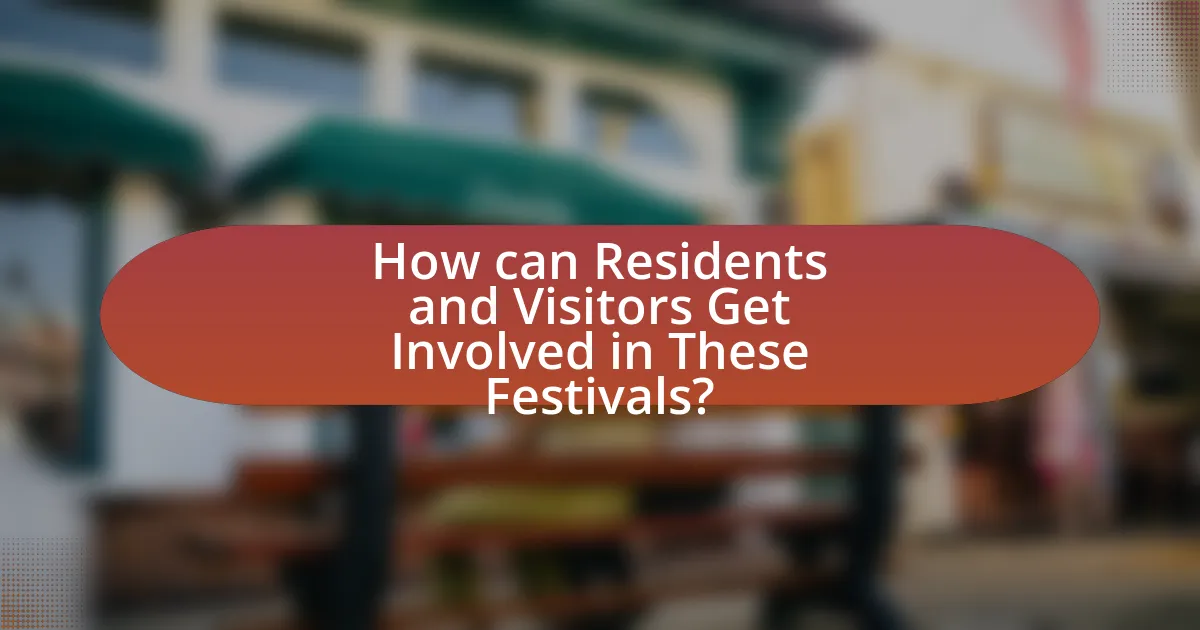
How can Residents and Visitors Get Involved in These Festivals?
Residents and visitors can get involved in these festivals by participating in volunteer opportunities, attending events, and engaging in workshops. Many festivals actively seek volunteers to help with logistics, setup, and activities, providing a chance for community members and tourists to contribute. Additionally, attending the various events allows individuals to experience the culture firsthand, while workshops often offer hands-on learning experiences related to the festival’s theme. Participation in these activities fosters a sense of community and cultural appreciation, enhancing the overall festival experience for everyone involved.
What opportunities exist for volunteering at the festivals?
Volunteering opportunities at the festivals include roles such as event setup and teardown, assisting with guest services, managing information booths, and helping with activities and workshops. These positions allow volunteers to engage directly with festival attendees and contribute to the overall success of the event. Many festivals also offer training sessions for volunteers, ensuring they are well-prepared for their responsibilities.
How can local businesses participate in festival activities?
Local businesses can participate in festival activities by sponsoring events, setting up booths, and collaborating with festival organizers. Sponsorship allows businesses to gain visibility and promote their brand while supporting community events. Setting up booths enables them to showcase products or services directly to festival attendees, fostering customer engagement. Collaborating with organizers can include providing resources, such as food, entertainment, or promotional materials, which enhances the festival experience and strengthens community ties. These methods not only increase local business exposure but also contribute to the overall success of the festival.
What are the benefits of attending these festivals for newcomers?
Attending cultural festivals offers newcomers the opportunity to integrate into the community and experience local traditions. These festivals provide a platform for social interaction, allowing newcomers to meet residents and other newcomers, fostering connections and friendships. Additionally, newcomers gain insights into the cultural heritage and practices of the area, enhancing their understanding and appreciation of the local culture. Research indicates that participation in community events can significantly improve social cohesion and personal well-being, as highlighted in studies by the National Endowment for the Arts, which found that engagement in cultural activities leads to increased community attachment and personal satisfaction.
What tips can enhance the festival experience for attendees?
To enhance the festival experience for attendees, it is essential to plan ahead by researching the festival schedule, activities, and any special events. Attendees who familiarize themselves with the lineup can prioritize must-see performances and avoid missing out on key experiences. Additionally, arriving early allows attendees to secure optimal viewing spots and enjoy the atmosphere before crowds build. Staying hydrated and wearing comfortable clothing are also crucial, as festivals often involve long hours of walking and standing. According to a study by the National Endowment for the Arts, engaging with cultural events can significantly increase overall satisfaction and enjoyment, reinforcing the importance of preparation and comfort for a positive festival experience.
How can visitors prepare for the unique aspects of each festival?
Visitors can prepare for the unique aspects of each festival by researching the specific traditions, customs, and schedules associated with the event. Understanding the festival’s history and significance allows attendees to engage more meaningfully. For instance, festivals may feature traditional attire, specific rituals, or unique culinary offerings that enhance the experience. Additionally, checking local guidelines, transportation options, and accommodation availability ensures a smooth visit. Engaging with local community resources or festival websites provides up-to-date information on activities and any special requirements, such as tickets or reservations, which are often necessary for popular events.
What are the best practices for enjoying the festivals safely?
To enjoy festivals safely, attendees should prioritize personal safety, situational awareness, and health precautions. Personal safety includes staying with a group, keeping valuables secure, and being aware of emergency exits. Situational awareness involves monitoring surroundings for potential hazards and avoiding overly crowded areas to reduce the risk of accidents. Health precautions include staying hydrated, using sunscreen, and following any local health guidelines, especially during pandemics, as seen with the COVID-19 protocols that emphasized mask-wearing and social distancing at large gatherings. These practices collectively enhance the festival experience while minimizing risks.
